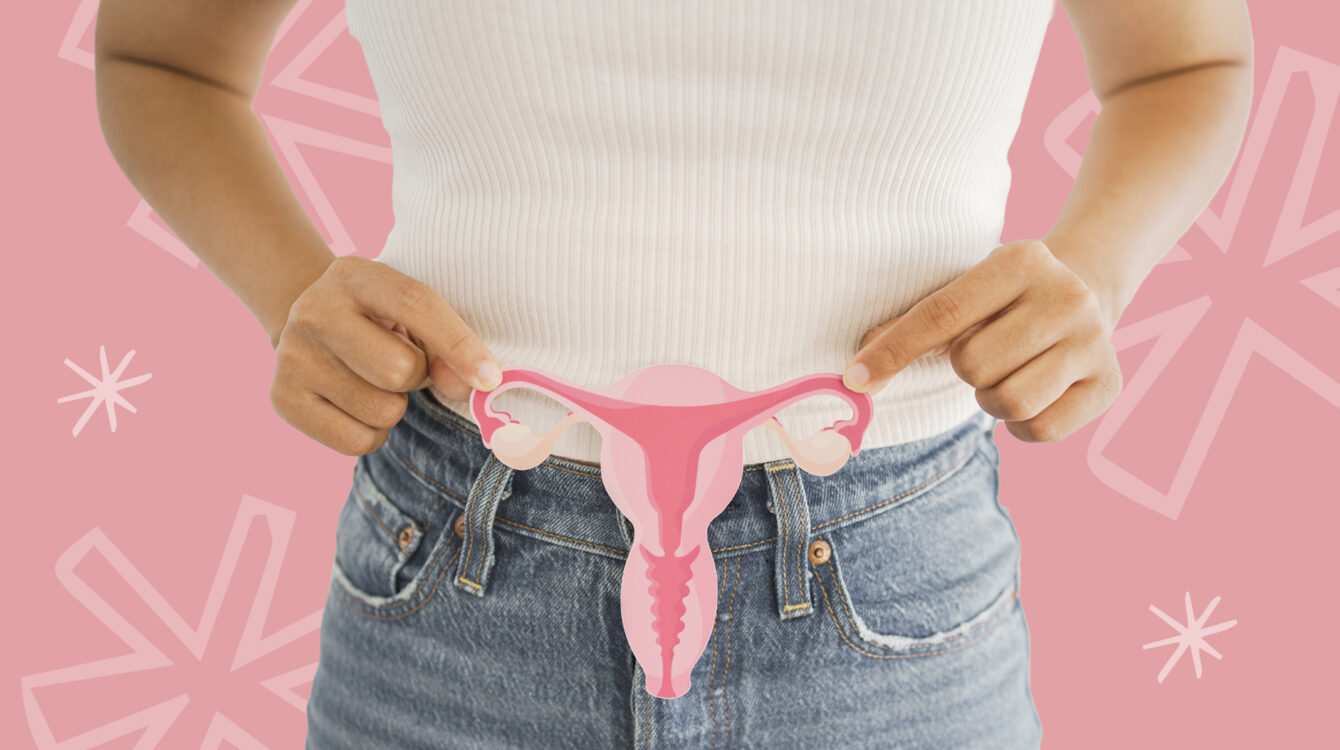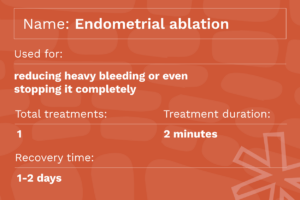
Managing Menorrhagia: Your Complete Guide to Endometrial Ablation to Treat Heavy Menstrual Bleeding (HMB)
If you’re one of the millions of women who struggle with heavy, prolonged menstrual bleeding each month, you understand how it can dramatically impact your quality of life. From constant worry about bleeding through clothes to extreme fatigue from blood loss, heavy periods (medically known as menorrhagia) can even make routine activities challenging.[1,2]
The good news? For women who don’t plan to carry children or those who have past child-bearing age, there is an effective solution that exists, which many women aren’t aware of – Endometrial Ablation.[3]
Top 10 Questions About Endometrial Ablation
1. What is Endometrial Ablation?
Endometrial Ablation is primarily used to treat menorrhagia (Heavy Menstrual Bleeding (HMB) for women who have not responded to medication or other treatments.[1]
While several treatment options exist, Endometrial Ablation offers a solution that can dramatically reduce or even eliminate monthly bleeding. The procedure involves thinning and removing the lining of your womb without removing your womb.[3]

2. When is Endometrial Ablation recommended as a treatment?
If you find that you are soaking through menstrual products after 1-2 hours, having periods lasting longer than 7 days or experiencing significant lifestyle disruption due to heavy bleeding, then Endometrial Ablation could help you.[1]
Typically, Endometrial Ablation is recommended when other treatments (such as hormonal medications or an IUD) haven’t worked or aren’t suitable for the individual.[4]
It is also only recommended for those who either don’t want children or those who have completed their family. Pregnancy following endometrial ablation has been reported to carry high rates of complications including miscarriage, intrauterine growth restriction, preterm birth, adherent placentation, and perinatal and maternal mortality. Hence, it is recommended that women use effective contraception and avoid future pregnancy. [5]
3. How is Endometrial Ablation performed?
The procedure is typically performed on an outpatient basis, meaning you can go home the same day. The procedure takes up to 40 minutes from start to finish, with the actual treatment taking only a couple of minutes to complete. Note, that if you are on your period, it is often not possible to perform this treatment therefore you may need to reschedule.[4]
There are two different devices that the NHS uses for Endometrial Ablation:[4]
- NovaSure® – a heated mesh. This procedure involves passing high-frequency energy waves through the lining of the womb.[6]
- Minitouch – a microwave device. This procedure involves a gently warming 2-3 treatment cycle to remove the lining.[7]
4. What are the benefits of Endometrial Ablation?
There are several benefits of undergoing Endometrial Ablation as a treatment for heavy menstrual bleeding.
It is a one-off minimally invasive procedure, that can be performed in an outpatient setting. With no pre-treatment required, patients will receive local anaesthetic in the cervix (and in some cases the uterus), in order to make the procedure more comfortable and aid recovery. [8,9] The procedure lasts a maximum of 2 minutes (average 90 seconds), and in most cases, patients can resume daily activities the following day.[9]

5. Will Endometrial Ablation stop my periods completely?
The results vary from person to person. Some women stop having periods completely, some still experience light spotting or much lighter periods, and only a small percentage may not see significant improvement.[3] A previous study found that 5 years after NovaSure® treatment, 79% of patients experienced no further menstrual bleeding or spotting, and 96% noticed a reduction in bleeding to normal levels or less.[8]
6. How does Endometrial Ablation affect hormones?
One of the benefits of Endometrial Ablation is that the procedure doesn’t affect your hormone balance. As the procedure only affects the uterine lining, your ovaries continue to function normally, producing hormones just as they did before.[10]
7. What is the recovery process like after Endometrial Ablation?
For most women, they can return home the same day as the procedure and will experience mild cramping for a couple of days. They may also experience watery or bloody discharge for several weeks or months in some cases. This is normal and may come and go depending on activities. Many women find they can return to normal activities within 24 – 48 hours after the procedure.[11]
8. Can I get pregnant after Endometrial Ablation?
Pregnancy after Endometrial Ablation is possible however it is dangerous and not recommended. Due to the lining of the uterus being significantly reduced during the procedure, it is not able to support a pregnancy. There is also an increased chance of miscarriage or ectopic pregnancy. If a pregnancy does continue, there can be serious problems associated with the placenta such as the placenta growing abnormally into the wall of the uterus or the baby being small due to poor blood flow of oxygen and nutrients.[10]
If heavy periods are interfering with your quality of life, don’t continue to suffer in silence. Treatments like Endometrial Ablation can help you reclaim your quality of life, from the exhaustion and daily struggle of menorrhagia.
9. Is the Endometrial Ablation procedure permanent?
The majority of women who have endometrial ablation, find that their abnormal bleeding has successfully reduced. In around half the cases, some women will stop having periods altogether, following the procedure.[12]
However, the results can vary. If endometrial ablation doesn’t control your bleeding, you may need further treatment. In some cases, re-ablation is required in order to tackle the bleeding, otherwise a hysterectomy may be considered. Around 1 in 10 women who have an ablation will eventually go on to have a hysterectomy.[12,13]

10. Are there alternatives if it isn’t right for me?
Although a very safe and effective treatment to reduce and (in some cases) stop your Heavy Menstrual Bleeding, Endometrial Ablation isn’t the right procedure for everyone.[14]
There are other options available to you, which your doctor might recommend trying first:
- Intrauterine system (IUS) – a small, hormone-releasing device that sits in the womb. It works by thinning the womb lining, which can ease heavy bleeding.[13]
- Medications like the combined pill or tranexamic acid can also be effective in reducing blood loss during periods.[13]

![]() If heavy periods are dictating your life and you’re unsure of their cause, take a look at our treatment table for more information on heavy bleeding, and speak with your GP about whether this procedure might be right for you: https://www.wearwhiteagain.co.uk/treating-heavy-periods/
If heavy periods are dictating your life and you’re unsure of their cause, take a look at our treatment table for more information on heavy bleeding, and speak with your GP about whether this procedure might be right for you: https://www.wearwhiteagain.co.uk/treating-heavy-periods/
References:
1) NHS Choices. (2019). Overview – Heavy periods. NHS. https://www.nhs.uk/conditions/heavy-periods/
2) Heavy periods symptoms | Wear White Again. (2022, September). Wear White Again. https://www.wearwhiteagain.co.uk/heavy-periods/heavy-blood-loss/
3) Endometrial Ablation | Health Information | Bupa UK. (n.d.). Www.bupa.co.uk. https://www.bupa.co.uk/health-information/womens-health/endometrial-ablation
4) Endometrial ablation – South Tees Hospitals NHS Foundation Trust. (2024, June 18). South Tees Hospitals NHS Foundation Trust. https://www.southtees.nhs.uk/resources/endometrial-ablation/
5) Ibiebele, I., Nippita, T. A., Baber, R., & Torvaldsen, S. (2020). A study of pregnancy after endometrial ablation using linked population data. Acta Obstetricia et Gynecologica Scandinavica, 100(2), 286–293. https://doi.org/10.1111/aogs.14002
6) NovaSure ® Endometrial Ablation Information for patients. (n.d.). https://www.ouh.nhs.uk/patient-guide/leaflets/files/96837novasure.pdf
7) Minitouch Endometrial Ablation For the Treatment of Heavy Periods Patient Information. (n.d.). https://www.wwl.nhs.uk/media/.leaflets/5ff43f5d82b157.24552867.pdf
8) Endometrial Ablation – A Gynaecologist’s Experience | Wear White Again. (2023, May 15). Wear White Again. https://www.wearwhiteagain.co.uk/blog/endometrial-ablation-performed-as-an-outpatient-procedure-a-consultant-gynaecologists-experience/
9) Wear White Again. (2023b). Treatment for Heavy Bleeding; Endometrial Ablation. [online] Available at: https://www.wearwhiteagain.co.uk/treating-heavy-periods/endometrial-ablation/
10) Endometrial Ablation. (n.d.). https://ranzcog.edu.au/wp-content/uploads/Endometrial-Ablation.pdf
11) NovaSure Endometrial Ablation. (2016). Hologic UK. https://www.hologic.co.uk/en-gb/products/novasure-endometrial-ablation#4257225834-1032526932
12) Mishra, D.R.K. (2025). Endometrial Ablation Frequently asked question. [online] Laparoscopyhospital.com. Available at: https://www.laparoscopyhospital.com/frequently_asked_question_about_endometrial_ablation.html
13) www.bupa.co.uk. (n.d.). Endometrial Ablation | Health Information | Bupa UK. [online] Available at: https://www.bupa.co.uk/health-information/womens-health/endometrial-ablation.
14) Wear White Again. (2023). Treatment for Heavy Bleeding; Endometrial Ablation. [online] Available at: https://www.wearwhiteagain.co.uk/treating-heavy-periods/endometrial-ablation/





